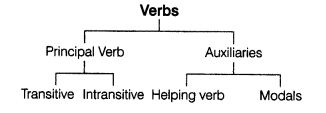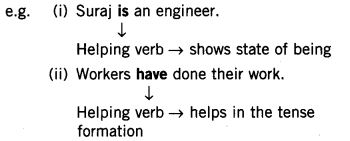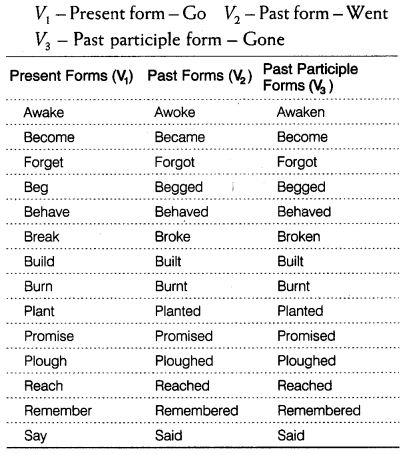CBSE Class 7 English Grammar – Verbs
A word that denotes an action or a state of being is called a verb,e.g.
- He plays football. (Action word)
- Mr Gupta is a cashier. (State of being)
Types of Verb
The following types of verb are as follow

Principal Verbs
Action words are called Principal Verbs. All verbs in English language except 24 are principal (main) verbs.

Principal verbs are two types of verbs
1. Transitive Verb
A verb that takes object with them is called a Transitive Verb.

2. Intransitive Verb
A verb that does not take any object with it is called an Intransitive Verb,

Helping Verbs
Verbs that either help in the formation of tense or its mood. Generally helping verbs are used to show the state of being.

Helping verbs are of two types
1. Auxiliary Verb
Verbs that help in the formation of tense and mood. Here are some auxiliary verbs
- Been, being, is, am, are, was, were
- Do, does, did
- Have, has, had
- Shall, will
2. Modal Verbs
Verbs that denote the mode of action of the main verb are called Modal Verbs. Can, could, may, might, need, dare etc are modals.
Forms of Verb
There are three forms of verbs. When we change the verbs from one form to another, it is called conjugation of verbs.

Practice Questions and Solutions
Question 1:
In the following sentences identify the principles and helping verbs.
- Thieves where running with the loots.
- The mother cooks for the family.
- College can impart quality of education.
- Plants make their food their by own.
- She must finish the work on time.
Solution:
- Principal Verb : running
Helping Verb : were - Principal Verb : cooks
Helping Verb : X - Principal Verb : impart
Helping Verb : can - Principal Verb : make
Helping Verb : X - Principal Verb : finish
Helping Verb : must
Question 2:
In the following sentences identify the principles and verbs states its type.
- The baby laughing heartily.
- Students are reading the books.
- Smita writes a long letter.
- The crow was falying high in the sky.
- The man was jumping on the floor.
Solution:
- Laughing (Intransitive)
- Reading (Transitive)
- Writes (Transitive)
- Flying (Intransitive)
- Jumping (Intransitive)
Question 3:
In the following sentences identify the subjects and the objects.
- The foodballer kicks the ball.
- A boy cry loudly in the park.
- Mahi was sleeping in her room.
- The hunter killed the lion.
- Sheela has decorated her house.
Solution:
- Subject : Footballer
Object : the ball - Subject : A boy
Object : X - Subject : Mahi
Object : X - Subject : The hunter
Object : The lion - Subject : Sheela
Object : her house
Question 4:
In the questions given below a word or a part of sentence has been underlined. Identify the underlined part and choose the correct option.
- The storm caught the sailor.
(a) Transitive verb (b) Intransitive verb
(c) Helping verb (d) Modals - His friend told him not to pluck the flowers.
(a) Object (b) Complement
(c) Pronoun (d) Linker - According to me, she should work hard.
(a) Object (b) Complement
(c) Modals (d) Auxiliary - The gardener trimmed the plants in the garden.
(a) Object (b) Complement
(c) Intransitive verb (d) Transitive verb - The athlete has broken his own record.
(a) Transitive verb (b) Intransitive verb
(c) Helping verb (d) Modal
Solution:
- (a)
- (a)
- (c)
- (d)
- (c)
Question 5:
Fill in the blanks with the correct verb from the options.
- The old man liked to watch the children ……………… in the garden.
(a) work (b) see
(c) play (d) spit - Don’t disturb her. She is ……………… an application to her principal for leave.
(a) wasting (b) writing
(c) spending (d) working - The king of Spain ……………… to celebrate .Christopher Columbus’ return from his famous royage.
(a) stated (b) called
(c) worte (d) wished - His work has …………….. millions of people to escape a great deal of pain.
(a) gained (d) wanted
(c) helped (d) told - His duties included ……………… doctors during operations.
(a) speaking (b) throwing
(c) calling (d) assisting - I would buy a big house If I ……………… Rs. 5 crore.
(a) spent (b) caught
(c) flew (d) earned - He could not come because he has ……………… sick.
(a) met (b) get
(c) fallen (d) visited - He wanted to ……………… his bungalow for Rs. 10 crore.
(a) take (b) sell
(c) invented (d) know - Pollution is ……………… detrimental effects on the lives of all.
(a) causing (b) giving
(c) taking (d) sharing - I ……………… my teacher what I wrote.
(a) printed (b) showed
(c) erased (d) copied
Solution:
- (c)
- (b)
- (d)
- (c)
- (d)
- (d)
- (c)
- (b)
- (a)
- (b)
Question 6:
Use the correct form of the verb given in the brackets to complete the following paragraph.
Mr Koch, the mathematics teacher ……………… (1) (give) Albert the reference he ……………… (2) (want).
Albert ……………… (3) (get) summoned to the head teacher’s room. The head teacher told Albert that his work ……………… (4) (be) terrible and he (will) be punished if he ……………… (5) (continue) the same way. Albert was ……………… (6)(tempt) to say a few words, then thought otherwise.
Solution:
- gave
- wanted
- was
- would
- continued
- tempted